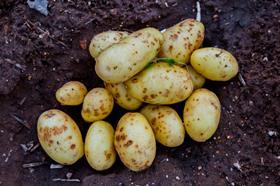
The multiples are notoriously strict when it comes to specifications on the size, shape and cosmetics of their fresh produce, but as growing conditions become increasingly unpredictable and wonky veg cements its place, retailers have had little choice but to become more flexible with their suppliers.
“Retailers have been very understanding of the pressure on the potato crop this season,” says Greenvale’s marketing director Leon Mundey. “As a business we have been open and collaborative with our customers and have kept them informed of predicted yields and potential pressures throughout the season.”
In August six of the UK’s nine biggest supermarkets – namely Aldi, Asda, M&S, Morrisons, Lidl and Tesco – responded to questions from the NFU on what they were doing to help growers cope with this year’s extreme weather conditions. The reaction from retailers has been encouraging, particularly on potatoes, with several adjusting their size, shape and/or cosmetic specifications, to allow higher levels of scab or other imperfections. AHDB Potatoes has also had reports of supermarket chains allowing producers extra growing time to catch up on yield.
Most potato growers are still harvesting this season’s maincrop potatoes and have a few weeks to go before everything is in, but yields are likely to be down significantly, with AHDB Potatoes forecasting a three per cent drop in planted area to the third-lowest level on record. The size of individual tubers has also been limited, and Greenvale reports specific issues with secondary tuber growth, early sprouting and a higher prevalence of common scab. “With continued demand, low yields and mixed quality crop, the pressure on price will play a role as the season develops and top-quality potatoes will demand a premium.”
Since potatoes are increasingly sold through pre-arranged contracts, which only allow for a degree of variation in price, the most pronounced swings are seen on the ‘free-buy’ market. AHDB Potatoes’ sector strategy director Dr Rob Clayton reports that prices shot up from just over £100 per tonne at the end of last season to over £300 per tonne at the beginning of the current campaign. Since then the price has eased to £263 per tonne as the delayed harvest has kicked into gear. “We’ve switched from last season, where there was an oversupply of potatoes and free-buy prices spent much of the year close to the cost of production, to a new season where there may be an undersupply,” Clayton explains.
Unsurprisingly, the producers that have suffered most from the drought conditions have been those without irrigation. “The situation affected all varieties of potato, and access to irrigation was the key to yield in this particular season,” says Clayton. “Some 49 per cent of the land on which UK potatoes are grown had access to some, but not necessarily adequate, irrigation according to last year’s stats, and the 51 per cent of land without it will have been hardest hit.” While crop damage has not been limited to certain varieties, Greenvale adds that its maincrop and baking potatoes have been worse affected than new, salad and baby varieties.
Demand for salad potatoes has been high in recent months, according to potato supplier Branston, with varieties like Charlotte enjoying strong sales growth. “Understandably, with a long, hot summer, potato salads and lighter potato meals have been very popular,” says managing director James Truscott. “Our customers’ premium ranges are also generating a loyal following and we’re working hard with our growers to make sure that these ranges stand out in the category.”
According to Truscott, consumers “seem to appreciate the differentiated taste, texture and consistency” of premium varieties, and Branston is seeing continued interest and growth in potatoes that “offer something a bit different or special”, for example heritage varieties. “Orchestra and Michelle are both whites that are performing well,” he says. “Inca Bella, our faster-cooking Phureja cross, is earning a reputation as a great roaster, and Laura, the finest red that’s ideal for mashing, is proving popular.”
At the other end of the spectrum are consumers who want quicker and easier food, with products that either provide inspiration for meal preparation or make the task that little bit easier. Truscott says Branston is focusing on the ‘helping hand’ trend, developing products that are part-prepared and allow the consumer to add their own twist at home.
“This means they still feel like they’ve cooked something themselves, rather than having everything done for them,” he explains. Branston’s peeled potatoes and pre-chopped sweet potato fries are listed in Tesco.






No comments yet